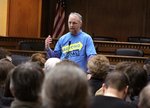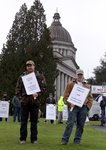


OLYMPIA — With close to a third of their annual income on the line, members of the local boilermakers union believe they have a real stake in the future of TransAlta.
“We need to find a good balance between jobs and the environment,” Blaine Roulst said while meeting with fellow union workers outside the state senate building.
Roulst, president of Boilermakers Local No. 502 out of Puyallup, joined several of his fellow boilermakers Saturday afternoon in a show of support for coal-dependent jobs and to present an alternate voice during a Sierra Club-sponsored rally that drew hundreds to a “Coal Free Washington” rally at the Capitol.
Some at the rally were concerned that TransAlta’s plan, in conjunction with the Department of Ecology, to cut greenhouse gas emissions by 50 percent in the next 15 years isn’t good enough.
“It is essential that we transition the Centralia plant away from coal as soon as possible,” said Doug Howell, senior representative for Coal Free Washington, which is demanding that the state not only up TransAlta’s deadline to 2015 and remove tax breaks the company currently enjoys but in fact do away with coal entirely.
Other citizens were concerned with Sierra Club’s plan, which they believe could prove devastating to the 300 plus employees at TransAlta as well as the 300 or more union workers who come in once a year for maintenance.
“We need to keep that plant open,” said Bob Guenther, president of the Thurston-Lewis-Mason Labor Council. “I support the $200 million a year economy that TransAlta brings to the Centralia area.”
Guenther also supports continued tax breaks for TransAlta. He said the company earned the incentives by spending $300 million on carbon emissions-cutting scrubbers at the plant in the late 1990s.
“We have to stick by our word, or how will that look to other companies we may want to draw to our state in the future?” Guenther said. “We haven’t given TransAlta nearly enough time to recover that cost.”
Howell and others with Coal Free Washington are unmoved by these arguments. They insist that the millions of dollars going to Canada-based TransAlta in tax breaks should be used to bring other, greener jobs and industries to Centralia and surrounding areas.
The Sierra Club and the Northwest Energy Coalition support entirely different types of energy production, like natural gas or wind, to replace the power and by extension the pollution being generated at the steam plant.
Union workers Saturday were skeptical of these ideas. They support clean coal technology, which TransAlta president Steve Snyder has said makes coal greener than natural gas, and balk at words like “worker retraining” in a field where apprenticeships can last five years.
“And the chances of that money getting back to us are pretty slim,” said one member of the union during Saturday’s rally, referring to the fact that these workers are hired on a contract and probably wouldn’t feel any payoff from a state payment to TransAlta employees if money were used for economic development rather than tax breaks.
All these issues and more could be considered, said Howell, if TransAlta would just allow Sierra Club representatives to sit at the table during negotiations between the steam plant and the state.
“We want to talk to TransAlta, but they are boxing us out,” Howell said. “The public’s input is vitally important as decisions are made about the future of the dirty and dangerous plant.”
Marcy McAuley, spokesperson for TransAlta, said during a phone interview Saturday afternoon that public input will be taken at various stages of talks with the state.
“But they call the shots, not us,” she said.
The Centralia plant is essential to Washington’s power supply, she added.
“Coal power still has a place in Washington state and across the nation,” McAuley said. “It’s reliable and low cost.”
And grouped with natural gas and nuclear energy, coal provides what is known as base-load power generation — or power that doesn’t rely on the shifting availability from naturally generated wind, water, or solar power.
“People have to realize that base-load power generation is essential for renewable growth to even happen,” she said.
•••
Dian McClurg is a freelance writer living in Centralia. She can be reached at dlmcclurg@comcast.net.